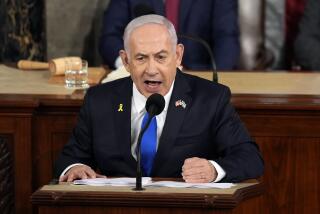Obama in Israel: ‘Peace must come to the Holy Land’
JERUSALEM -- Opening his first presidential visit to the nation’s closest Mideast ally, President Obama declared Wednesday that “peace must come to the Holy Land” during a red carpet arrival ceremony with Israeli leaders.
In remarks after landing at Ben Gurion International Airport in Tel Aviv, Obama described the U.S.-Israeli bond as “eternal,” the apparent theme of the three-day trip. The words “unbreakable alliance” are emblazoned on official signs, shirts, fliers and mugs all over Jerusalem and Tel Aviv.
Obama’s trip, the first foreign visit of his second term, is aimed at mending a fraught relationship with Israeli Prime Minister Benjamin Netanyahu and reassuring nervous Israelis that Obama is committed to their security.
Obama’s comments were notable for what he did not say, avoiding mention of the Palestinian conflict, settlement construction, Iran or any other sensitive issues. He instead immediately acknowledged Israel’s 3,000-year connection to the Holy Land, emphasizing that he was visiting “the historic homeland of the Jewish people.”
And he acknowledged the risks Israel faces since the Arab Spring uprisings in 2011 redrew the political landscape in the Middle East.
“Across this region the winds of change bring both promise and peril,” Obama said. “So I see this visit as an opportunity to reaffirm the unbreakable bonds between our nations, to restate America’s unwavering commitment to Israel’s security, and to speak directly to the people of Israel and to your neighbors.”
Israeli President Shimon Peres praised Obama “for the way you are. Thank you for what you do. Thank you for the hopes you carry with you.”
Netanyahu showed no sign of his frosty relations with Obama. He thanked the president for “standing with Israel” and joked that he had identified a few bars Obama might like to visit. Before leaving Washington, Obama had told an Israeli TV interviewer that he wished he could spend some time relaxing incognito in a Tel Aviv cafe.
More sensitive topics were certain to arise in subsequent speech and press statements.
From the tarmac, Obama’s motorcade drove to a nearby hanger to inspect part of the Iron Dome anti-missile system, which was designed in Israel but partially funded by the Pentagon.
The president hopped out of the SUV, telling Israeli military officials: “I’m a young man. I’m always looking for a chance to walk.”
He inspected a mix of rockets and mobile anti-missile batteries at the site, while a Israeli officer explained the technology. Later, Obama and Netanyahu walked together, both in shirt sleeves, to the president’s helicopter for the flight to Jerusalem
Obama’s first stop in Jerusalem was Peres’ home, where the men strolled the garden and dedicated a magnolia tree, Obama’s gift for his host.
“It is an incredible honor to offer this tree to this beautiful garden, and to someone who is champion of the Israeli people and a champion of peace,” Obama said, noting that the tree traveled on Air Force One. “And we’re very good gardeners.”
In addition to regional security issues, Peres is expected to appeal on behalf of Jonathan Pollard, an American intelligence analyst sentenced to life in prison after he was convicted in 1987 of passing reams of classified defense material to the Israelis. Peres has previously asked Obama to grant clemency to the Israeli spy.
Aides to the president say he will hear Peres out but believes the U.S. justice system is responsible for reviewing Pollard’s case and deciding on his release.
Obama also will visit Netanyahu at the prime minister’s residence for a private meeting and working dinner. At the top of the agenda is the status of efforts to curb Iran’s nuclear program.
In talks last month in Kazakhstan, the United States and five other powers offered concessions to Iran if it would agree to suspend uranium enrichment at an underground facility known as Fordo. Iran did not agree, but another round of talks is scheduled for April 5-6.
Obama has said U.S. policy is to prevent Iran from obtaining a nuclear bomb. He said last week that U.S. authorities believe Tehran is probably a year away from building a bomb if its leaders decide to do so, a long enough time frame to trigger U.S. intervention.
Netanyahu, who last fall warned that Iran could build a bomb by this spring or summer, is expected to pressure Obama to place greater urgency on the threat.
The two leaders began a joint press conference after they meet. The evening closes with a private working dinner between Obama and Netanyahu.
ALSO:
Obama starts first presidential visit to Israel
In Iraq, 10 years after U.S. invasion, legacy of war lives on
A Marine salutes the flag in Iraq -- the story behind the photo
Times staff writer Kathleen Hennessey in Washington contributed to this report.
More to Read
Sign up for Essential California
The most important California stories and recommendations in your inbox every morning.
You may occasionally receive promotional content from the Los Angeles Times.











